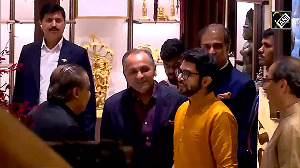RBI Governor Raghuram Rajan wanted to transform what many see as a slow-moving and bureaucratic RBI into a modern, nimble central bank.

In a video conference in mid-2014, Reserve Bank of India (RBI) governor Raghuram Rajan told employees that he wanted to hire talented external candidates and improve the quality of research at the 81-year-old central bank.
The proposals, described to Reuters by three officials who heard Rajan speak, would hardly seem out of place in any major institution on the planet.
But in the storied halls of the RBI, where staff have to pass comprehensive examinations to join public service and spend decades slowly moving through its ranks, Rajan's ideas were seen by some staff as controversial, the sources said.
"(The) entire process is being hurried up," a protest letter written United Forum of Reserve Bank Officers and Employees, the central bank’s staff union, read, according to a copy seen by Reuters at the time.
"There is a need for better clarity, communication – both internal and external, consensus and fairness to all stakeholders."
Rajan did not formally respond to the letter, according to several sources.
Since then, Rajan has only hired one permanent staff externally. It is not clear what role, if any, opposition from the rank-and-file RBI staff played in the low number of external hires.
The RBI declined to comment for this story.
Rajan's calls for out-of-the-box thinking were reiterated in a memo last month, seen by Reuters, which urged increased accountability and performance and was described by a half dozen mid-level officials as toughly worded, sparking similar misgivings among some in the bank's rank-and-file.
Such reactions highlight what has probably been one of the hardest fights of his tenure: transforming what many see as a slow-moving and bureaucratic RBI of 17,000 staff into a modern, nimble central bank.
Rajan said he also wants to improve training for staff, through initiatives such as sending them to other central banks for short stints, creating scholarships, and emphasising research, while also strategically bringing in outside expertise.
"In general, I am not trying to swamp the place," Rajan told reporters last week in response to questions about external hires at a press event following the RBI’s monetary policy announcement.
"When outsiders come in they have to show that they can actually deliver as advertised. It shouldn't be seen as a privileged position just because they got a foreign degree."
At stake are both Rajan's legacy and wider confidence in India's ambitious reform agenda, which seeks to make its economy and markets more robust and globally integrated.
His tenure expires in September and central bank watchers say he may only be able to finish the job if he is appointed to a second term.
Domenico Lombardi, an economist who has served on the boards of both the World Bank and the IMF, said it is vital for Rajan to persuade sceptics within the RBI and the government to integrate India into the world economy.
"Central banks are very conservative environments, and it takes far more than a three-year stint to change their culture," Lombardi said.
Since taking over as governor in 2013 in the midst of India's worst currency turmoil in two decades, Rajan, 53, has overcome several challenges to steer some of the biggest changes in the central bank's history.
These include introducing inflation targeting, tackling crony capitalism and successfully asserting the RBI's independence with New Delhi. Government sources say he has struck a personal relationship with Prime Minister Narendra Modi, even though he was appointed by a rival administration.
The former International Monetary Fund chief economist has also become a source of confidence for those investing in India and a leading voice for emerging markets on global economic policy issues.
"There is no alternative to officials like Rajan if India wants to signal that it is serious in its reform process," said Lombardi.
QUICK CHANGES
Rajan, who likes to start his day with an 8:30 breakfast, early by Indian government standards, is seen by many RBI employees as fast and decisive.
On his very first day at work in September 2013 and as the rupee was still near record lows, Rajan announced a slew of initiatives to stabilise markets.
Barely four months later, he set about reshaping monetary policy, shifting the bank's inflation target to consumer prices away from wholesale prices, the biggest central bank change since the country began economic liberalisation in 1991.
Rajan also streamlined operations, scaling back scheduled policy reviews to six from eight per year.
One RBI official said he ended dated practices, such as an RBI official hand-delivering copies of monetary policy statements to government officials. Statements are now directly uploaded to the web site.
Such rapid change, however, has brushed against the bank's slow and deliberative style, one that prizes consensus-building among stakeholders, though some changes have been welcomed.
EASY GOING
Unlike most previous RBI governors who have come from civil servant backgrounds, Rajan himself was an external hire, previously working as the chief economic adviser to the Congress-led government that was voted out in 2014.
People who work closely with Rajan describe him as genial and easy-going, compared with the more formal interactions favoured by past governors.
Upon his arrival, for example, four officials said Rajan reached out to younger staff, especially researchers, to hear their views and have lunch with them, stepping away from the 18th floor executive dining area with its expansive view of Mumbai.
At the same time, Rajan remains an exacting boss.
One senior official described a recent initiative to research the direct impact interest rates have on inflation and growth using econometric models, a much more demanding level of economic analysis than was requested by previous governors.
As Rajan put it in a speech in July last year: "The kind of economics we need is based on rigorous fundamentals – blood, sweat, tears, and toil."











